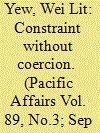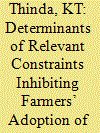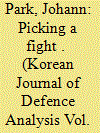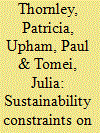|
|
|
Sort Order |
|
|
|
Items / Page
|
|
|
|
|
|
|
| Srl | Item |
| 1 |
ID:
149178


|
|
|
|
|
| Summary/Abstract |
How can we begin to understand “repression” when a soft authoritarian regime like Malaysia both tolerates yet simultaneously hinders environmental contention? I argue that addressing indirect repression in the form of state-imposed constraints is one such point of departure. Beneath the veneer of tolerance, repression still exists in subtler forms. Such unobserved constraints emerge mainly through non-coercive bureaucratic processes and procedures undertaken by state agents. Though aggregated effect may not defeat a movement, it nevertheless elevates the overall cost of collective action by circumscribing movement forms and options, and demobilizing resources and supporters. This perspective goes beyond the conventional issue_image_89_3_Environmental Protest Malaysia - EA photo1attention on coercion—the show and use of force—in non-democracies. Based primarily on activist accounts related to the Broga anti-incinerator campaign and the Kuantan protests against a rare earth plant in Malaysia, this article demonstrates how indirect repression, in the form of state-imposed constraints, is perceived, experienced, and responded to by activists. I point to four prominent ways in which the constraints indirectly undermine activists’ campaigns: ostentatious surveillance, judicial channelling, occupational repression, and administrative constraints. Intended or otherwise, constraints seem less costly than coercion and help absolve political rulers of direct culpability. Besides completing the picture of repressive patterns under authoritarianism in Malaysia, this article’s focus on constraints suggests that the authoritarian state is ambivalent about grassroots activism that does not challenge the political order.
|
|
|
|
|
|
|
|
|
|
|
|
|
|
|
|
| 2 |
ID:
179112


|
|
|
|
|
| Summary/Abstract |
The adverse effects of climate change on agricultural productivity are on the increase. This study employed both descriptive statistics and the multivariate probit model to estimate factors constraining the adoption of climate change adaptation strategies among smallholder farmers in the study area. The empirical results of the multivariate probit model showed that a lack of knowledge of climate change constraints was influenced by smallholder farmers’ age, gender, off-farm activity, susceptibility and membership in farmer-based organizations. Thus, to improve the adaptive capacity of farmers, government and development partners should work together to improve the conditions under which farmers can gain access to climate change information and suitable agricultural credit as well as policy incentives aimed at lowering the stringent conditions of borrowing in the agricultural sector.
|
|
|
|
|
|
|
|
|
|
|
|
|
|
|
|
| 3 |
ID:
148651


|
|
|
|
|
| Summary/Abstract |
Negotiations for the settlement of the Cyprus question have resumed amid a pressing geopolitical and economic reality. Greek and Turkish Cypriots adopt distinct interpretations of the United Nations – designated recipe for a bicommunal and bizonal federation in Cyprus. In the relative absence of major normative preconditions for settlement, including a lack of common vision and mutual trust, the pillar notions of federalism and consociationalism have been adapted to serve each side’s vital security concerns and to increase each side’s leverage in a future federal arrangement in Cyprus. This study conducted an opinion poll of young, educated Greek Cypriots to identify the preferred type of constitutional settlement in the context of a number of perceived motives, constraints, and preconditions. The findings of this survey reveal substantial consensus on the acceptance of a bizonal, bicommunal solution. Yet acceptance of a federal solution is subject to certain prerequisites. The study reveals the varying influence of current economic concerns on a prospective solution.
|
|
|
|
|
|
|
|
|
|
|
|
|
|
|
|
| 4 |
ID:
154936


|
|
|
|
|
| Summary/Abstract |
Research shows that autocracies as well as democracies have reasons to avoid
strong enemies. What, then, make democracies distinctive from autocracies
in conflict selection? A critical difference may lie in the normative constraints
democracies experience. Focusing on the roles of public sentiment and liberalism,
we argue that democrats bearing high levels of accountability are less likely to
choose armed conflict without justifiable causes. We assess the roles of three liberal
factors in regard to the characteristics of target countries: respect of human rights,
democratic representation, and economic interdependence. Material factors, such
as relative military capability and geographic constraints are also considered.
The results show that both autocracies and democracies tend to attack easier
foes, but democracies avoid attacking countries that respect human rights and are
economically interdependent. Additionally, unlike autocracies, democracies do not
view other democracies as attractive targets of military attacks.
|
|
|
|
|
|
|
|
|
|
|
|
|
|
|
|
| 5 |
ID:
092845


|
|
|
|
|
| Publication |
2009.
|
| Summary/Abstract |
Use of bioenergy as a renewable resource is increasing in many parts of the world and can generate significant environmental, economic and social benefits if managed with due regard to sustainability constraints. This work reviews the environmental, social and economic constraints on key feedstocks for UK heat, power and transport fuel. Key sustainability constraints include greenhouse gas savings achieved for different fuels, land availability, air quality impacts and facility siting. Applying those constraints, we estimate that existing technologies would facilitate a sustainability constrained level of medium-term bioenergy/biofuel supply to the UK of 4.9% of total energy demand, broken down into 4.3% of heat demands, 4.3% of electricity, and 5.8% of transport fuel. This suggests that attempts to increase the supply above these levels could have counterproductive sustainability impacts in the absence of compensating technology developments or identification of additional resources. The barriers that currently prevent this level of supply being achieved have been analysed and classified. This suggests that the biggest policy impacts would be in stimulating the market for heat demand in rural areas, supporting feedstock prices in a manner that incentivised efficient use/maximum
|
|
|
|
|
|
|
|
|
|
|
|
|
|
|
|
|
|
|
|
|